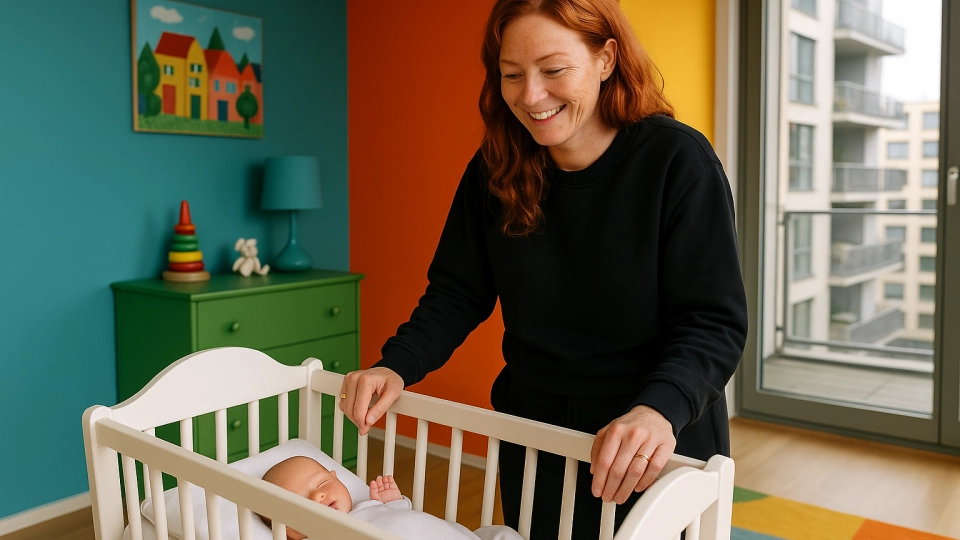How do you create a schedule that supports your child's healthy development while also meeting the needs of the whole family? If you're wondering what the ideal daily routine for your baby should look like, read on.
Why is a daily routine so important for infants?
An infant with a consistent daily schedule forms habits more easily and is generally calmer. Regularity also helps parents plan their day and manage household duties or work. By establishing a daily routine, you teach your child from an early age a certain regularity that is important for optimal physical and mental development.
Sleep, feeding, and wakefulness change rapidly during a baby's first year. Babies grow very quickly and their needs change as well. A firm yet flexible routine lets you observe, track, and better understand these changes. Through continuity and the regular repetition of certain activities, you can more easily spot any deviations, health issues, or developmental delays and respond to them in time.
A routine also helps you focus better on your child. If you go for walks at set times and have clear times for feeding, bathing, and bedtime, it's easier to feed your baby calmly or settle them to sleep. This structure helps your little one achieve calmer, deeper sleep.
Finally, a well-set routine leads to a happier baby and a happier family. When a child knows their routine and what to expect at certain times of day, they cry less and adapt more easily to changes and new situations. For you as parents, a routine provides a sense of control, perspective, and the ability to plan more precisely, which is important for your own calm and wellbeing.
How to optimally set a sleep routine?
Sleep is one of the most important parts of a child's routine during the first year. Babies need a lot of sleep; at first, they may sleep for up to 16 hours a day. The distribution of sleep across the day changes markedly over the months. In newborns, a sleep pattern isn't very apparent—babies fall asleep in short intervals, and regularity usually comes later, around three months.
From about the fourth month, it pays to start setting fixed daytime sleep periods. For infants 4 to 7 months old, three daytime naps are ideal—morning, midday, and afternoon. Around 8–9 months, children typically transition to two daytime naps lasting 1–2 hours, along with quality nighttime sleep that usually starts around 7–8 p.m. and ends between 6–7 a.m.
Put your baby in the crib at roughly the same time and ideally in the same way each time. A consistent pre-sleep setup signals that it's time to rest. In the evening, settle your child in a room with as little noise and light as possible, ideally with dim lighting. This supports better production of melatonin, the hormone necessary for quality sleep.
Be patient. It may take a few weeks for your child to adjust to set times. It's normal and okay if your baby sometimes falls out of the routine, for example during illness, growth spurts, or teething. The key is your consistency and patience. Don't fully adapt to the baby; instead, gently but firmly guide them to learn regularity.
Feeding — how often, when, and for how long?
The first year is also crucial nutritionally. Newborns feed quite frequently—usually every 2–3 hours. Over time, the intervals lengthen.
Around four to six months of age, in line with pediatric recommendations, start introducing complementary foods. Typically, we start with vegetable purees at lunchtime, then gradually from the sixth to eighth month add fruit, meat, porridges, and other types of food.
Regular mealtimes greatly support digestion and calm your child throughout the day. A child should have 5–6 meals a day, ideally at regular intervals. Mealtime rituals foster healthy habits. Later, teach your little one to get used to a certain way of dining—feeding in a calm environment, in a high chair, without toys or screens around.
Play and active time — how to support your child's development?
A daily routine includes not only rest and meals, but also active moments full of play and discovery. Approach your baby sensitively and choose age-appropriate activities. Even walks with your child in the stroller count as active parts of the day.
Evening ritual — the key to peaceful bedtime
A predictable nightly routine, such as bathing or reading stories, helps your child relax, which makes falling asleep easier and supports their sleep routine.
A daily routine is a great helper for every family. Create it in accordance with your child's individual needs. And remember—not just the routine, but above all your consistent care and love are the keys to helping your child thrive. If you're currently looking for suitable toys to support your little one's development, visit our selection in our e-shop. Give your baby joy and quality development—it will pay off many times over.

